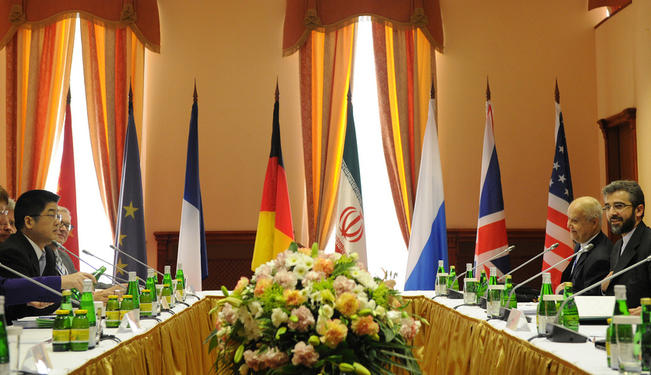
Iran has become one of the most heavily sanctioned countries in the world, as the international community attempts to prevent Tehran from building a nuclear weapon. The resulting isolation has imposed significant challenges on the Iranian economy, which has shown signs of strain particularly in the past year. Background Since the 1990s, the International Atomic Energy Agency (IAEA) and Iran have played an extended game of cat-and-mouse over the country’s nuclear program. Although Iran insists that its program is purely peaceful, the country’s secrecy and belligerence toward the IAEA have only heightened concerns that Tehran is pursuing a nuclear weapons capability. The United Nations (UN), European Union (EU), and a number of national governments have responded with increasingly stringent sanctions, which have brought the Iranian economy under significant strain in the past year. The UN imposed its first sanctions on Iran in 2006, after President Mahmoud Ahmadinejad announced that Iran would resume its work on uranium enrichment, a program that the country had suspended in 2003. By 2010, the UN had ratified three more rounds of sanctions, which aimed to force Iran to stop enrichment and reprocessing activities and comply with the IAEA. The measures targeted Iran’s supply of weapons and nuclear-related materials and technology, and froze the assets of key individuals and entities. In November 2011, the IAEA indicated that it had “credible” evidence that Iran may have worked on developing a nuclear weapon. In response, the United States and its allies imposed a new wave of sanctions intended to isolate Iran from the international financial system and limit the government’s oil revenues and petrochemical investments. Subsequent EU, US, and other bilateral sanctions continued to target Iran’s oil, natural gas, and financial sectors. In July 2012, the EU implemented a total ban on the import, purchase, and transport of Iranian crude oil, and in October, it extended the ban to include natural gas. In addition, by the end of 2012, the EU had frozen the assets of Iran’s central bank, banned the trade of gold and other precious metals with Iranian public entities, and prohibited transactions with Iranian banks and financial institutions. During the same period, the US froze Iranian government and financial institution assets and targeted non-US financial institutions doing business with Iran’s central bank. Most notably, in June 2012, the US banned the world’s banks from completing oil-related transactions with Iran. In addition to the intended consequences of these sanctions, the sheer quantity imposed in the past two years has had a multiplier effect. Because the sanctions tend to be complicated and overlapping, many businesses avoid working with Iran altogether for fear of accidentally violating one of the regulations. As a result, Iran has become largely isolated from the global market. Why are the Sanctions Relevant? In the past year, Iran’s economy has slumped under the weight of international sanctions, contributing to heightened tensions between Iran and the West. While it is unclear how much of Iran’s economic woes have resulted from other factors, such as the government’s long-term mismanagement of the economy, sanctions have certainly played a role in Iran’s current economic predicament. By July 2012, Iranian crude oil exports had dropped more than 20 percent since 2011, according to the US, and in September, Iran experienced its lowest daily oil production level since 1988. The rial lost nearly 40 percent of its value in 2012, contributing to a dramatic rise in the price of many staples and threatening to elevate the already high inflation rate. Riots broke out in October as a result of Iran’s increasingly acute economic crisis. Tehran’s response to intensified pressure from the West has been aggressive and erratic and has worsened its already hostile relationship with Israel. The Iranian government has conducted missile tests, defiantly announced nuclear advances, and threatened to close the Strait of Hormuz, a vital shipping route. In addition, two attacks against Israeli embassy personnel have been attributed to Iran. Israel, for its part, has signaled its readiness to strike Iranian nuclear facilities and has pressured the US to establish “red lines” on Iran’s nuclear program.
Israel’s military posturing has abated in recent months, but the West has maintained its economic pressure on Iran, with the US recently passing two new sets of sanctions. The remainder of the year is likely to bring more tense episodes as Iran and the West continue their battle of wills.
For more than 10 years, Fair Observer has been free, fair and independent. No billionaire owns us, no advertisers control us. We are a reader-supported nonprofit. Unlike many other publications, we keep our content free for readers regardless of where they live or whether they can afford to pay. We have no paywalls and no ads.
In the post-truth era of fake news, echo chambers and filter bubbles, we publish a plurality of perspectives from around the world. Anyone can publish with us, but everyone goes through a rigorous editorial process. So, you get fact-checked, well-reasoned content instead of noise.
We publish 2,500+ voices from 90+ countries. We also conduct education and training programs on subjects ranging from digital media and journalism to writing and critical thinking. This doesn’t come cheap. Servers, editors, trainers and web developers cost money.
Please consider supporting us on a regular basis as a recurring donor or a sustaining member.
Support Fair Observer
We rely on your support for our independence, diversity and quality.
Will you support FO’s journalism?
We rely on your support for our independence, diversity and quality.











